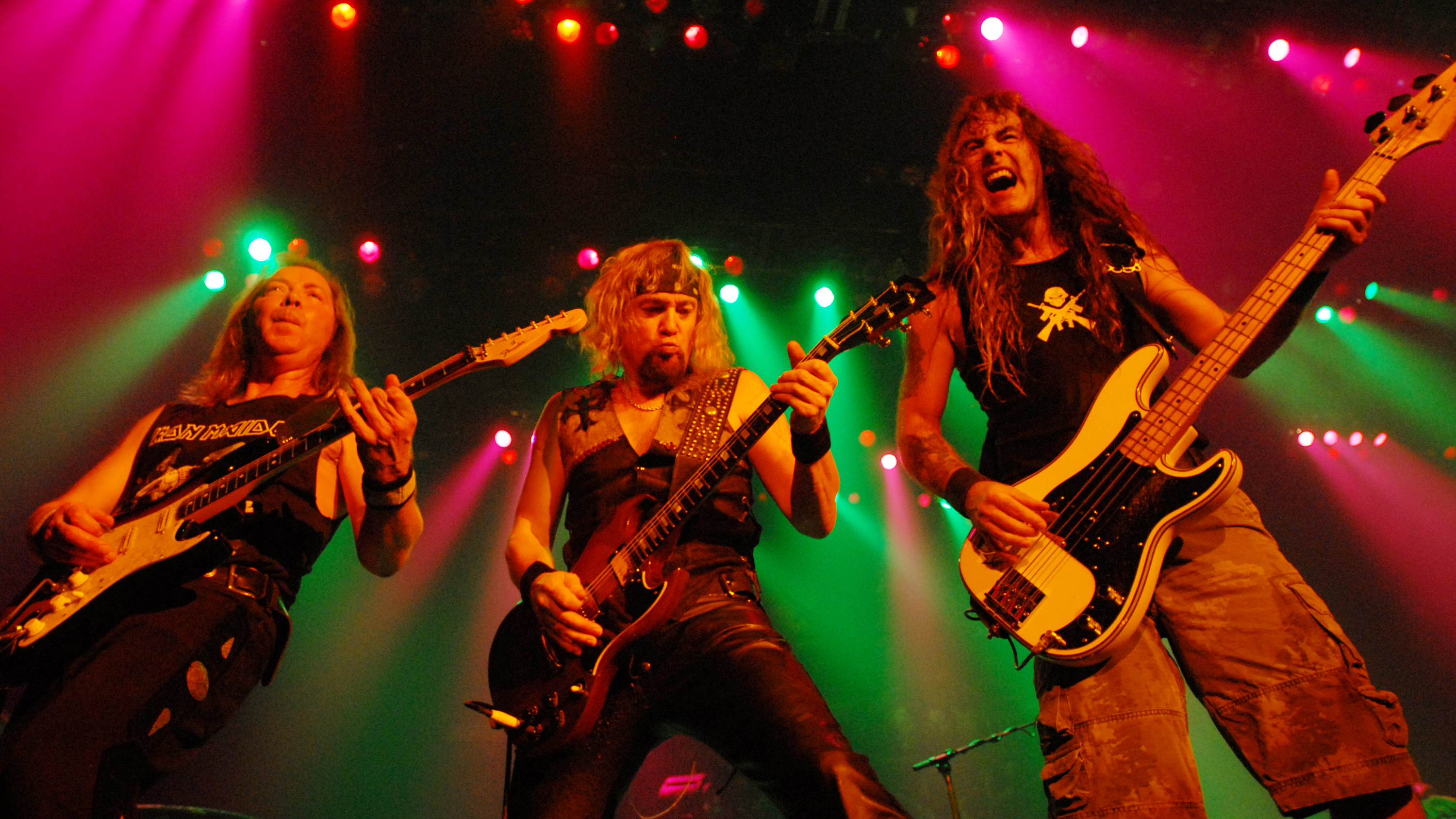This article originally appeared in Classic Rock #101.
When Iron Maiden toured Japan for the first time in the early 1980s, it took them the best part of 36 hours – a day and a half – to get to their destination. And what a long, strange trip it was.
“It was unbelievable,” recalls bass player Steve Harris. “We flew to Frankfurt, then Abu Dhabi, then Karachi, then Bangkok and finally Tokyo. It was pretty horrendous but it was the cheapest way to get there. We’d only had a couple of records out. It was all we could afford.”
“Japan was a big culture shock,” reflects guitarist Dave Murray. “It took a while to get used to. Now, of course, it’s become very familiar and we’ve toured most of our albums there. But yeah, back in the 80s we went the cheap and cheerful way around the planet. We got drunk on one flight and sobered up on the next. It was probably the first time I experienced jet lag. I remember thinking: from now on, this is how I’m going to feel for half of my working life. You never quite get over it.”
“I first came to Japan in 1981 – but it was with Ian Gillan’s band, not Maiden,” guitarist Janick Gers recollects. “I’m all for getting out, having a look around and sucking in the culture. I remember walking back to the hotel with [Gillan bass player] John McCoy. We stopped, looked around and there were about 20 kids following us. They were fascinated by John’s bald head and my long hair.”
Classic Rock is travelling with Harris, Murray, Gers and the rest of the Maiden crew on board the Bullet Train, speeding at maximum velocity – we’re talking a cool 186mph – between Tokyo and Hiroshima. It’s a four-hour trip but it’s incredibly sleek and civilised. Much like the whole of Japan, in fact.
The train hurtles relentlessly down the tracks, swishing through the air like an unsheathed samurai sword. The seats are big armchairs that recline to the near horizontal. The amount of legroom would suit a giraffe. Outside the windows a mix of heavy urbanisation and pockets of countryside whizzes by in a blur. It’s a hell of a way to travel.
Guitarist Adrian Smith dozes with his iPod headphones tiss-tissing away. Singer Bruce Dickinson plays Flight Simulator on his laptop. Drummer Nicko McBrain collars a waitress pushing a food-and-drink trolley. She’s marble-faced, jet-haired, doll-like and beautiful; very much the Japanese stereotype – but a stunning stereotype all the same. And the antithesis of your typical back-of-a-bus British Rail employee.
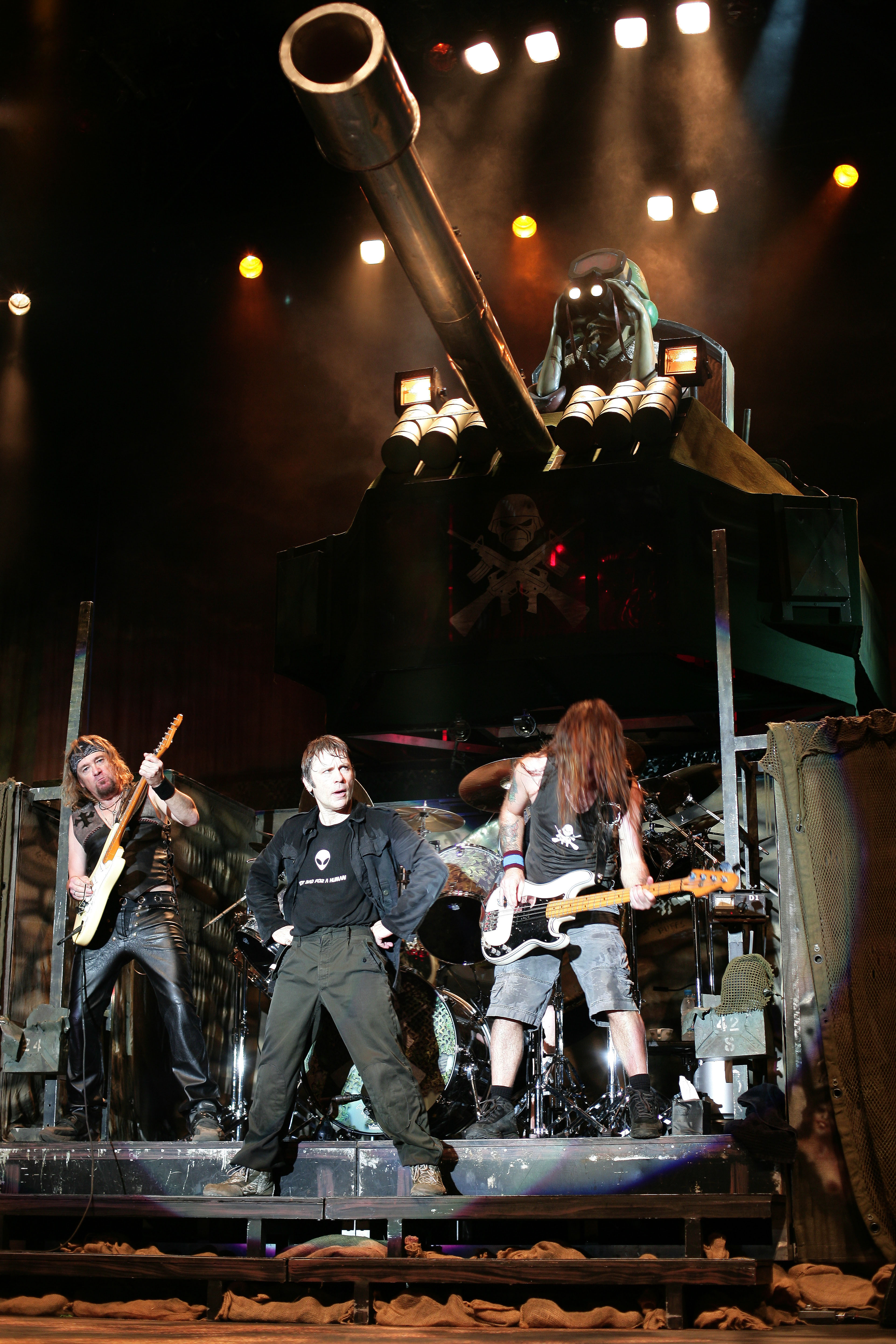
Nicko orders two coffees. The price is 600 yen – about £2.70. He extracts a 1,000-yen note from his wallet. “You keep change,” a smiling Nicko offers in pidgin English.
The waitress is horrified. “Ah-no-no-no-no!” she shrieks. The message is clear: no-pesky-Gai-Jinshould-dare-offer-tip-to-gracious-Japanese-person. It’s an affront to their well-mannered, highly structured culture. It simply isn’t the done thing. (For anyone who hasn’t read the James Clavell novel, Gai- Jin means ‘foreigner’.)
Maiden manager Rod Smallwood is sitting in front of us reading a Led Zeppelin feature in Rolling Stone. And ear-wigging the conversation between drummer and waitress.
“Bah!” Smallwood blusters. “Take no notice, Nicko. The Japanese are so bloody repressed. It’s all whisky and sex to them.”
It’s an interesting alternative viewpoint, that’s for sure.
Clearly, Rod is still bristling – or, more accurately, fuming – from The Great Barbecue Restaurant Bust-Up of a couple of days before.
Let’s backtrack to that time. It’s pouring with rain in Tokyo town. Absolutely bucketing down. A special welcome-to-Japan meal for all of Maiden has been arranged, inappropriately, at a Korean barbecue restaurant.
However, someone has got the address of the place wrong. The fleet of taxis carrying the band, organised by the Nippon branch of record label EMI, ends up in a variety of different locations. Steve Harris spends the best part of an hour stranded in an underground car park. Eventually, after a long wait, everyone arrives at the right location. Last in line is a bedraggled and beleaguered Smallwood. He’s apoplectic with rage and sacks EMI Japan on the spot. (They are later reinstated.)
Korean barbecue restaurants require customers to wear special protective aprons. It’s a messy business, eating at such establishments, because you do your own grilling on mini barbecues placed on your table. A scary business, too. “Rod looks exactly like Sweeney Todd with his apron on,” Steve Harris whispers. “He’s ready to cut someone’s throat. I wouldn’t want to get on the wrong side of him when he’s in one of those moods.”
The restaurant bill amounts to 225,000 yen – the wrong side of £1,000. That’s a lot of sausages.
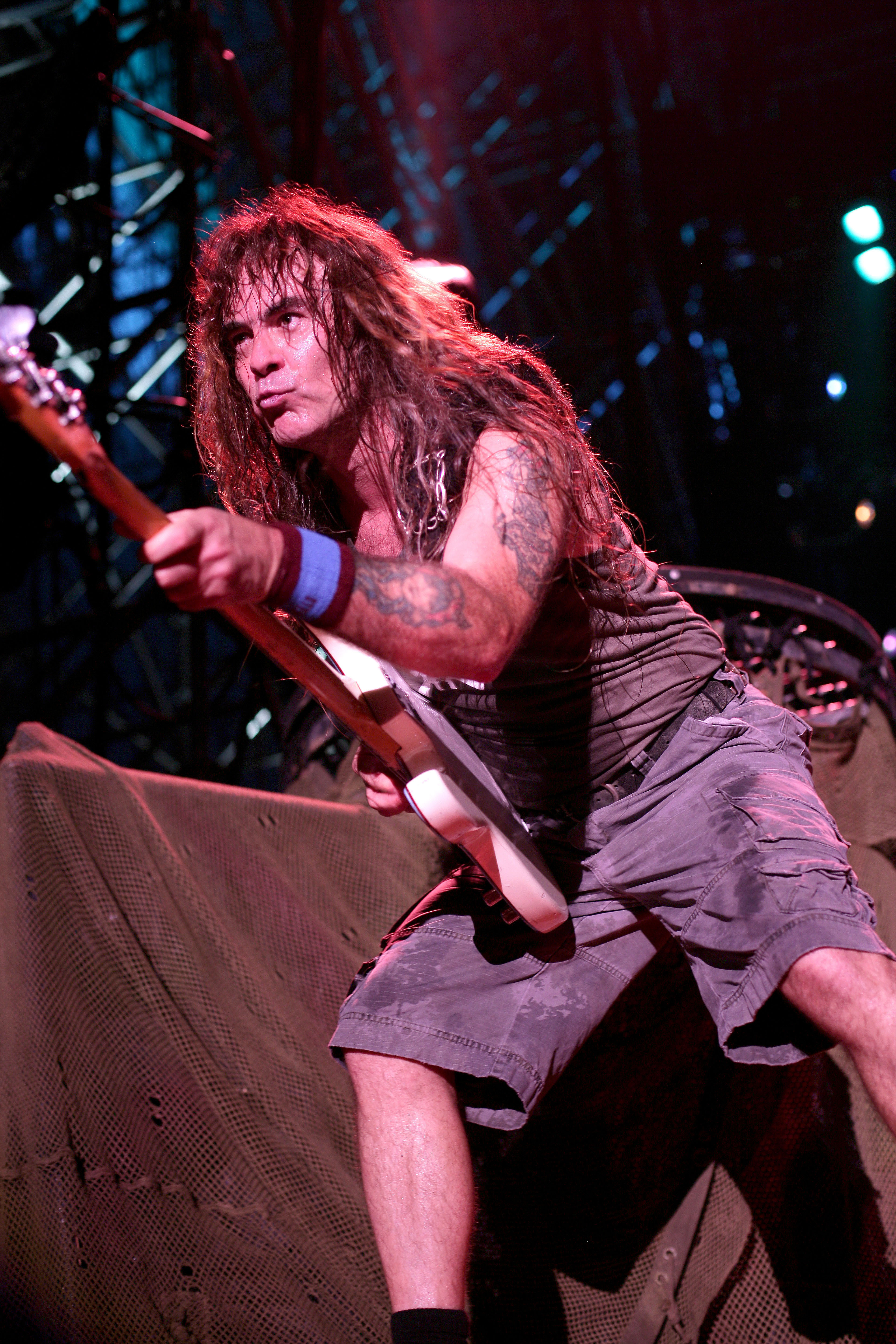
On to the next day. Maiden are playing Tokyo’s legendary Budokan, the 10,000-seat room is sold out and order has been restored. Outside the venue, a single man in a bright-blue uniform is directing traffic with an illuminated baton. You can hear crickets chirruping above the chatter of the crowd. The procession for Maiden merchandise winds methodically around a succession of barriers. It could be a queue for a theme park ride.
The Budokan isn’t situated in Tokyo’s seething metropolitan heartland, as you might expect. Rather it’s reached via a pleasant stroll through the immaculate gardens of the city’s Imperial Park.
Whatever impressions Cheap Trick might have given you back in 1979, the Budokan is a surprisingly unprepossessing concrete block. It was originally built for the judo competition at the 1964 Tokyo Olympics. But an entirely different form of grunting and groaning will be taking place inside tonight.
A sign next to the box office says: ‘No camera. No video. Stricly (sic) prohibited to bring any alcohole (sic) into the venue.’ The ever-intrepid Classic Rock finds beer for sale over the road in a café – but only from a solitary vending machine stocking the local brew, Asahi, for 500 yen (large can) and 350 yen (small can). If this were Britain a mass of gagging headbangers would be snaking around the block and beyond. But this is Japan, and just four people are waiting in line. Two are reading books.
There’s a murmur of approval as the doors to the Budokan open at precisely 6pm and Maiden’s fans troop inside like drones into a hive.
The scene within is suitably regimented. There are vast grey plastic sheets spread over the floor. The ranks of seats on the ground are ranged perfectly with not a chair leg out of line. The ceiling is sculpted like a chrysanthemum flower, and a giant rising-sun flag dangles from high up above. (It should also be noted that the Budokan’s public loos are fitted with bottom-soothing bidets that shoot warm water into your nether regions. And that the ends of the toilet rolls are folded into V-shapes, just like you’d expect in an upmarket hotel.)
Japanese crowds, we learn, are much more animated than they used to be. But gigs still begin very early here – Maiden are due on stage at 7.15pm, that’s halfway through Emmerdale in British terms – to prevent matters from getting too out of hand.
Back in the early days, when western rock’n’roll first began to infiltrate Japan, everything was much more restrained. In fact if a fan happened misbehave during the course of a show he or she would be walloped over the head by a security guard wielding a rolled-up newspaper.
“It was an amazing sight,” remarks Rod Smallwood, who has joined us out front along with Steve Harris. “Just like those bash-the-mole machines you see at funfairs.”
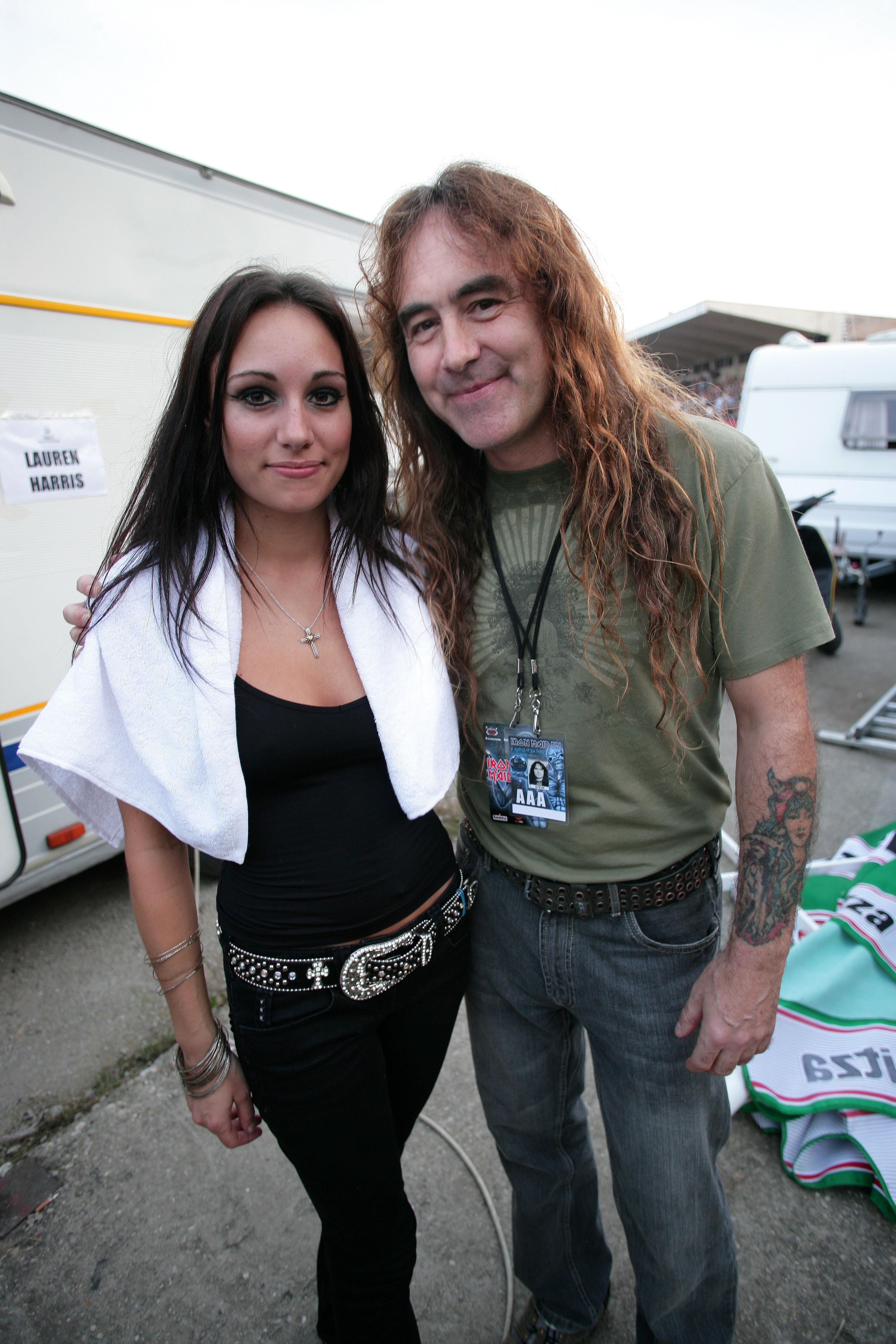
“The Japanese don’t physically go crazy, they’re not allowed to,” Harris states. “They clap and sing along but it is a different vibe. If you didn’t know what to expect it might freak you out as a player.”
We retreat backstage where Bruce Dickinson is the purveyor of bad news. “We’ve got a dead drummer,” he says plainly. It appears Nicko McBrain is suffering from a double whammy: an overindulgence of red wine the night before, and a flu bug. A doctor visited him earlier this morning to give him some vitamin B12 shots.
Smallwood is unconcerned: “Nicko’ll be fine. He always is.” McBrain arrives right on cue and proclaims: “I’m not even supposed to be here.” But he is. That’s the main thing.
Steve Harris returns to the auditorium to watch his daughter Lauren, who is supporting Maiden in Japan, deliver a short but sassy performance.
The scene is set. In a scant few minutes Maiden will take to the stage and deliver their new album A Matter Of Life And Death – in its entirety.
The band are playing the whole of their latest record, track by track, 10 songs in sequence, beginning with Different World and closing with The Legacy – and to hell with the consequences.
- The Top 10 most underrated Iron Maiden songs
- I Went Behind The Iron Curtain With Iron Maiden
- Steve Harris: Genesis Was Never The Same After Peter Gabriel Left
- What's it like to be the female Bruce Dickinson?
Ah-so. Very interesting. Depending on your viewpoint, it’s either an act of incredible courage or one of unbelievable arrogance. Or perhaps a combination of the two.
Prior to their visit to Japan, Maiden had played 11 concerts in the US and Canada. At some of those shows, or so Classic Rock hears, there was an air of disgruntlement among fans who expected a set packed full of old classics. Thankfully – apart from a single shout from someone demanding Can I Play With Madness – there’s hardly any restlessness inside the Budokan tonight.
With a stage set built to resemble the trenches in war-torn battlefield – sandbags piled everywhere – the Maiden show begins somewhat tentatively but then gathers pace at a frightening rate. The momentum is monstrous.
The band members have all dressed down for the occasion. Frontman Bruce Dickinson is subdued in plain jacket and trousers; bassist Steve Harris wears camouflage cut-offs and black socks with his trainers, in the manner of a Blackpool holidaymaker. There are few on-stage announcements – but when Dickinson shouts, “Scream for me, Budokan!” it rattles the fillings in your teeth.
If Maiden’s intention is to let the music do the talking, then that’s exactly what happens. When the hyper-energetic Dickinson occasionally leaves the stage, the rampant riffage generated by the band’s three guitarists – Dave Murray, Adrian Smith and Janick Gers – is frankly awe-inspiring.
Highlights are imperious renditions of Out Of The Shadows and The Reincarnation Of Benjamin Breeg, and as the set winds down you can’t help but feel you’ve witnessed a performance packed with tension, drama and sheer bloody-minded brilliance. Martial artistry of the highest order. Stratospheric metal, if you will.
But it’s not over yet as a series of old songs – including Fear Of The Dark, Iron Maiden, The Evil That Men Do and Hallowed Be Thy Name – finally arrives. Then Maiden’s mascot, Eddie, appears. Driving a tank, no less! And embarrassment ensues for Classic Rock’s camera-wielding companion…
“We have a very special guest here tonight,” Bruce Dickinson announces. “World famous photographer Ross Halfin.” (Halfin bobs up from the photo pit and waves at the crowd.)
“Now, Ross, what time is it?” (Silence from Halfin.) “What? We have a world famous photographer in the house… and he doesn’t know what the bloody time is?!” (Silence continues. Dickinson chuckles.) “Well, then – let me tell you what the time is: it’s Two Minutes To Midnight!”
Halfin, later, sheepishly: “Look, I didn’t have my watch on. I genuinely thought Bruce wanted to know what the time was.”
Yeah. Right.
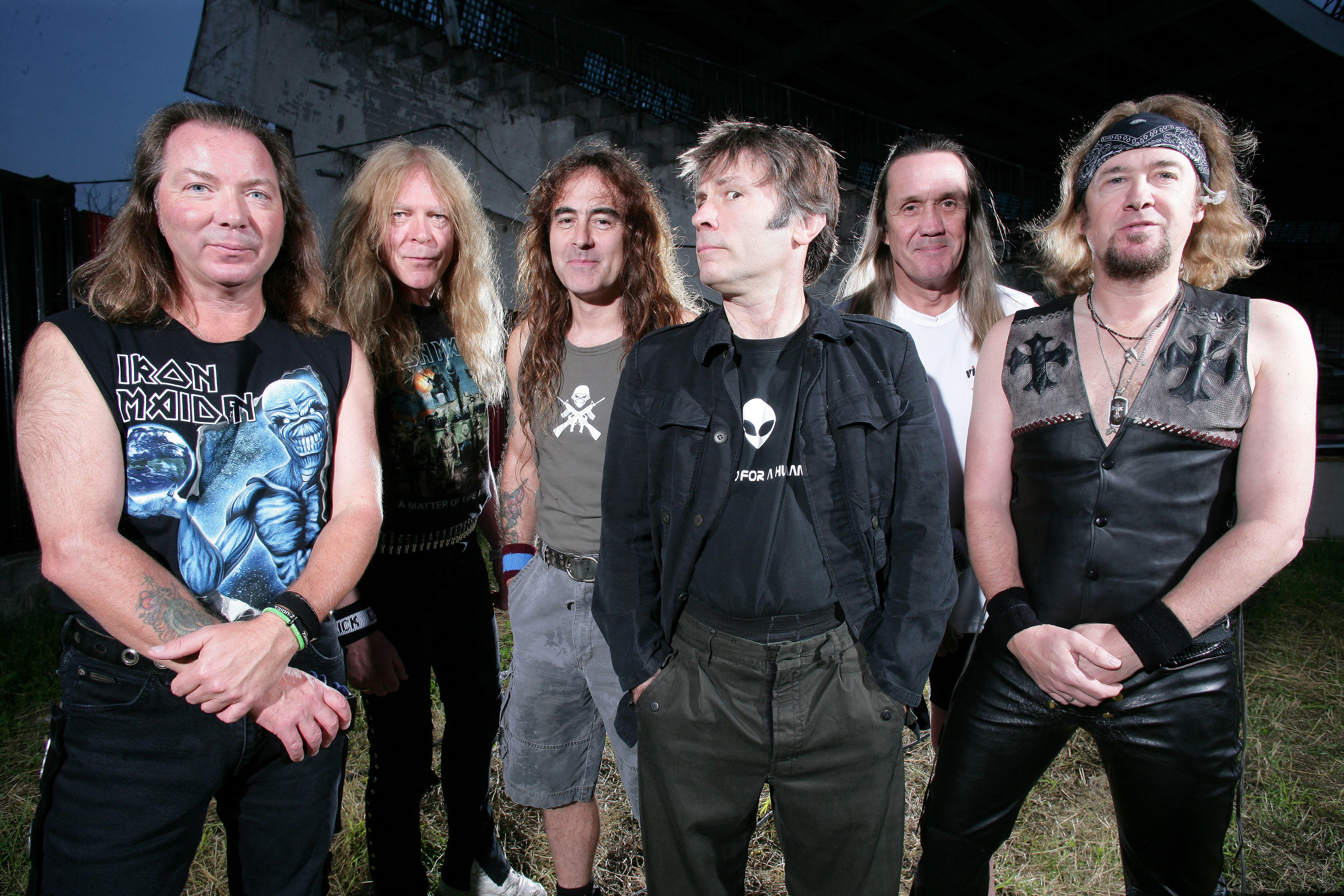
Back on the bullet train from Tokyo to Hiroshima, we quiz Dickinson about the wisdom of playing A Matter Of Life And Death from start to finish.
“It’s a throwback to our roots,” he responds. “When we were growing up there was no such thing as heavy metal. All the bands we respected were very varied. This is the sort of thing a group like Nektar would have done. I think that’s what gave us the idea that it would be a great thing to do. It gets us out of the mould.
“We thought it would be a really great way of differentiating ourselves from the pack, and making a big statement about how vital it is that we do new music. It’s just so important that you do stuff you believe in, and keep everything alive. Otherwise there’s no point in doing it.
“There’s so much opportunity to build in tension and drama. One of the reasons why I’m just dressed in a pair of old black combat pants and a black jacket is because I felt that it was good to be almost as neutral as possible, because you want everything to go through the music and the stage show.”
What about those supposed adverse reactions to Maiden’s show in the States?
“We could see there were a few people on the fringes looking a bit dumbstruck. But in front of us were lots and lots of really young kids who were into it. You’ve got these people who are stuck in a time warp, and America is a scary place in that respect. Nowhere else in the world do you get such a small, vocal minority. They write in to the internet out of all proportion to their numbers. You can’t pander to them, you just have to ignore them.
“They should all know by now that this is what we’re going to do. And they can always sell their tickets to someone else, because there’s plenty of people who want them. That really is our attitude.”
We say to Steve Harris that we remember seeing The Who at London’s Lyceum, when they debuted Quadrophenia, and Yes at London’s Rainbow Theatre, when they introduced Tales From Topographic Oceans. The latter was a particularly gruelling experience.
“I saw that Yes show as well,” Harris nods. “Enjoyed it, actually. And I went to see Jethro Tull do Thick As A Brick and Passion Play. It was great. I remember when Ian Anderson finished playing Thick As A Brick he said: ‘And now for our second song!’”
Like Dickinson, Harris has no qualms about giving A Matter Of Life And Death the full-on live treatment: “I think fans don’t know what they want until you give it to them. They might come along with the attitude of, oh, I want to hear a bunch of old stuff, but when they see it they’re pleasantly surprised.”
Maiden’s guitarists are of the same opinions.
Adrian Smith: “The new album does all hang together – I think it’d be odd to just play a few separate songs. There are subtle musical themes running through it which we didn’t realise were there when we were writing it.”
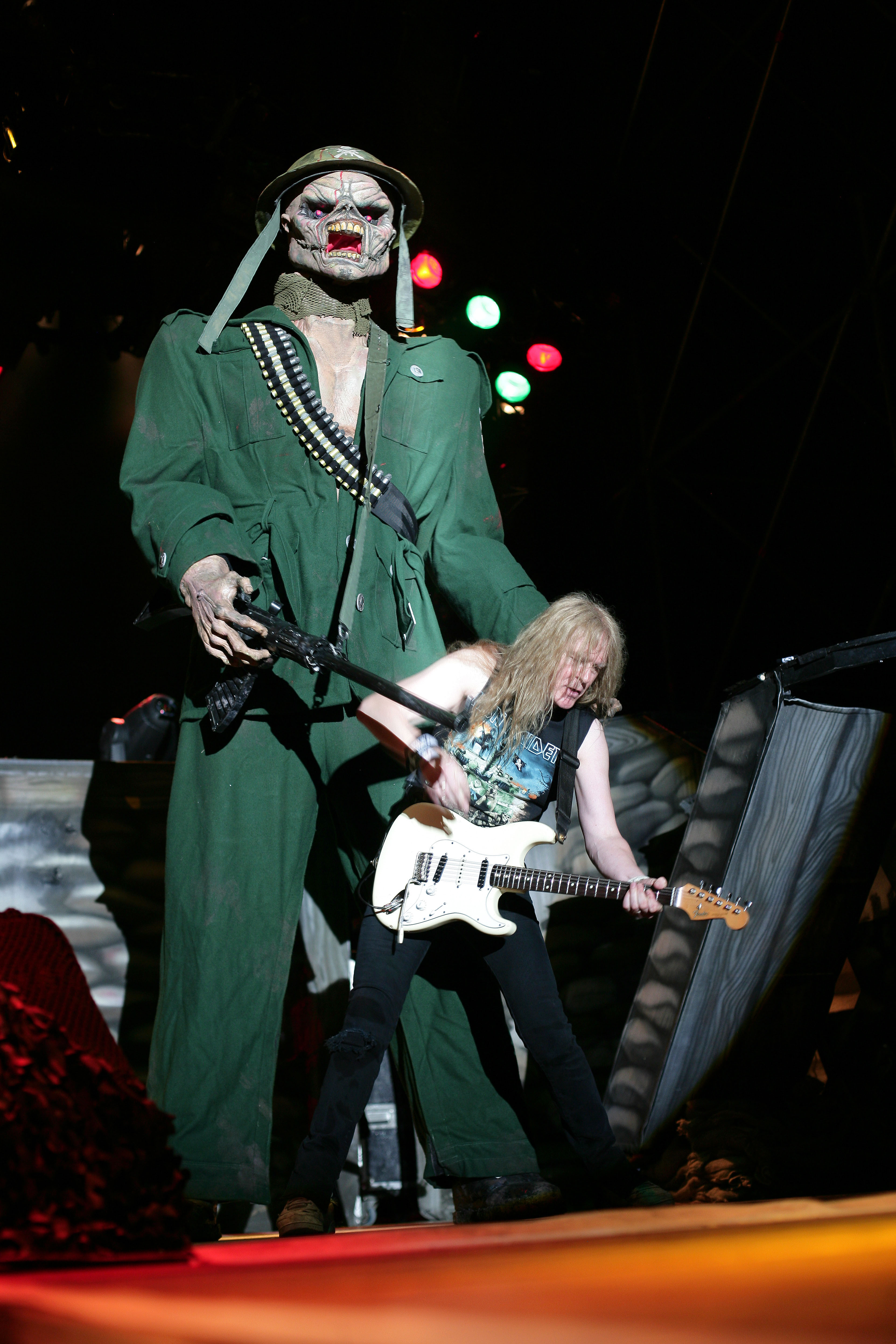
Dave Murray: “Obviously we’re doing the whole album live… it feels good for us to play it. It’s a special occasion. Hopefully in the future people will say: ‘I was there when Iron Maiden played the whole of A Matter Of Life And Death.’”
Janick Gers: “I’ve always been in bands who were – and are – very forthright in their decisions. When I was in [north-east New Wave Of British Heavy Metal band] White Spirit we never played encores. We were young and arrogant, I suppose. But you have to make a stand. I don’t want to be in a cabaret band; I don’t want to be in a band that’s a parody of what they were in the 1980s. We’re very proud of our history but we’re also very proud of the new album. There comes a point where we have to say: this is where we’re at now. You either stagnate or you try to push forward.”
In Classic Rock issue No.97, we described A Matter Of Life And Death as being full of ‘brilliantly bonkers prog metal’. So it’s no surprise to hear that a lot of Steve Harris’s early influences have come home to roost on the album.
“I was in this bootleg shop in Tokyo the other day. I picked up early Genesis, Jethro Tull, Wishbone Ash… It was a right old treasure trove. I think on the last three or four Maiden albums you can hear those kinds of influences more than ever. Blood Brothers on Brave New World for example, or the title track on the last album, Dance Of Death… There’s a couple of things on the new album where you can really hear the Tull influence – probably the middle bit of Out Of The Shadows. That’s very Tull. It’s not ripping off Tull at all, it’s not even paying homage to them really, it just comes out as an influence.”
Dickinson has this to say about Maiden’s prog rock inclinations: “I’m so pleased that we’re doing this stuff now. The band’s acquired this emotional depth to the playing. It’s always been there but it’s almost like in the past we’ve been a bit too rigid to actually admit. It’s out in the open now. And people are loving it. We added lots more colours to the palette.”
Warming to the theme, Harris adds: “I don’t think we’ve ever been a straight-down-the-line heavy metal band. There’s always been more to us than meets the eye. We don’t feel as if we’ve changed much, really. With the current show we are making a sort of a statement in a way… But I don’t know what that statement is exactly, other than to say: ‘Bollocks, we’re going to play all of the new album!’”
Like Tokyo, Hiroshima is a hyper-modern city that’s kept scrupulously clean. There’s no gum on the pavement or graffiti on the walls. The taxis – the cab driver’s model of choice is an American-style sedan called a Nissan Cedric (yes, Cedric) – all look like they’ve come straight out of the car wash.
Classic Rock takes time out to tour the Peace Memorial Park, a stark and sombre place full of statues and plaques that commemorate – if that’s the correct word; we doubt that it is – the dreadful day on August 6, 1945 when Hiroshima was destroyed by an atomic bomb. Adjacent to the park is the Genbaku Dome, or ‘Atomic Bomb Dome’, a building that survived miraculously when the bomb detonated 60 metres above it.
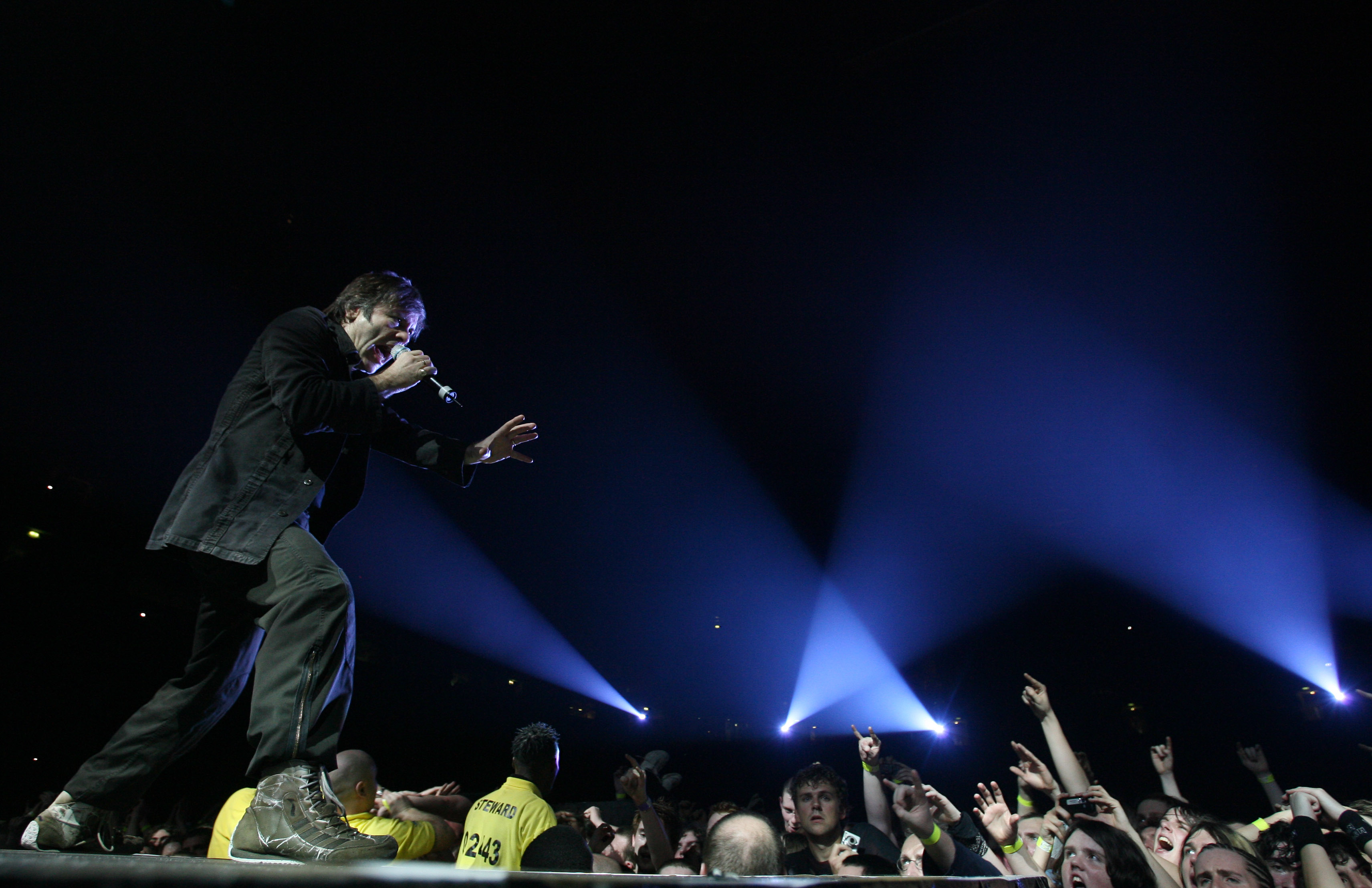
Inside the Peace Memorial Museum there’s an exhibit of a busted piece of brick wall. It looks innocuous until you notice a shadowy shape embedded into it – all that is left of a person who was vaporised in the explosion. But the most chilling display, to Classic Rock’s eyes, is that of a child’s metal tricycle that was caught up in the blast. It isn’t bent out of shape dramatically, it’s just strangely warped like something out of a Dali painting. Before going on show in the museum the bike had been buried in a back garden for many years, along with the body of the little boy who had been riding it.
Bruce Dickinson has been reading a book about Hiroshima and offers his perspective: “For the whole of Japan to have recovered from what happened here is a pretty astonishing achievement. One of the reasons why they [the Americans] chose Hiroshima as a target was that there was practically no place left to bomb – they wanted a city that was intact to see what their baby could really do. And Nagasaki [where another atomic bomb exploded] wasn’t meant to be a target at all – the plane carrying the bomb had a dodgy fuel tank and it ran out of gas. It couldn’t get to its primary target, which I believe was a military base. So Nagasaki was all a bit of a screw-up.
“J Robert Oppenheimer, the so-called father of the atomic bomb, went in to see [US President] Truman in tears when he found out what had happened in Hiroshima. Truman gave him a handkerchief and said: ‘Get out of my office, crybaby. You just built it. I fucking dropped it.’”
The venue for tonight’s gig is Hiroshima’s posh Kubinchokin Hall – a much smaller place than Tokyo’s Budokan. If the Budokan equates to London’s Wembley Arena, then the Kubinchokin is more like London’s Royal Festival Hall.
Backstage Adrian Smith is expressing slight misgivings about Maiden playing Hiroshima with their current war-themed stage set: “I’m a bit worried about how people are going to take it. But having said that, it’s not only Hiroshima. It’s to do with the current climate… Iraq and all that. Then again, I suppose it’s theatre, really. To be honest once I get on stage I’ll probably forget about it.
“But,” he adds, “I do remember when we first played Hiroshima – I think it was 1987. It was weird to walk around and see the Peace Park and then play a show to all these enthusiastic fans, who didn’t look like they had a care in the world.”
There is one track on A Matter Of Life And Death – Brighter Than A Thousand Suns – that is directly concerned with the atomic bomb and the arms race. Witness the lyrics: ‘Bombers launch with no recall/Minutes warning of the missile fall/Take a look at your last sky/Guessing you won’t have the time to cry.’
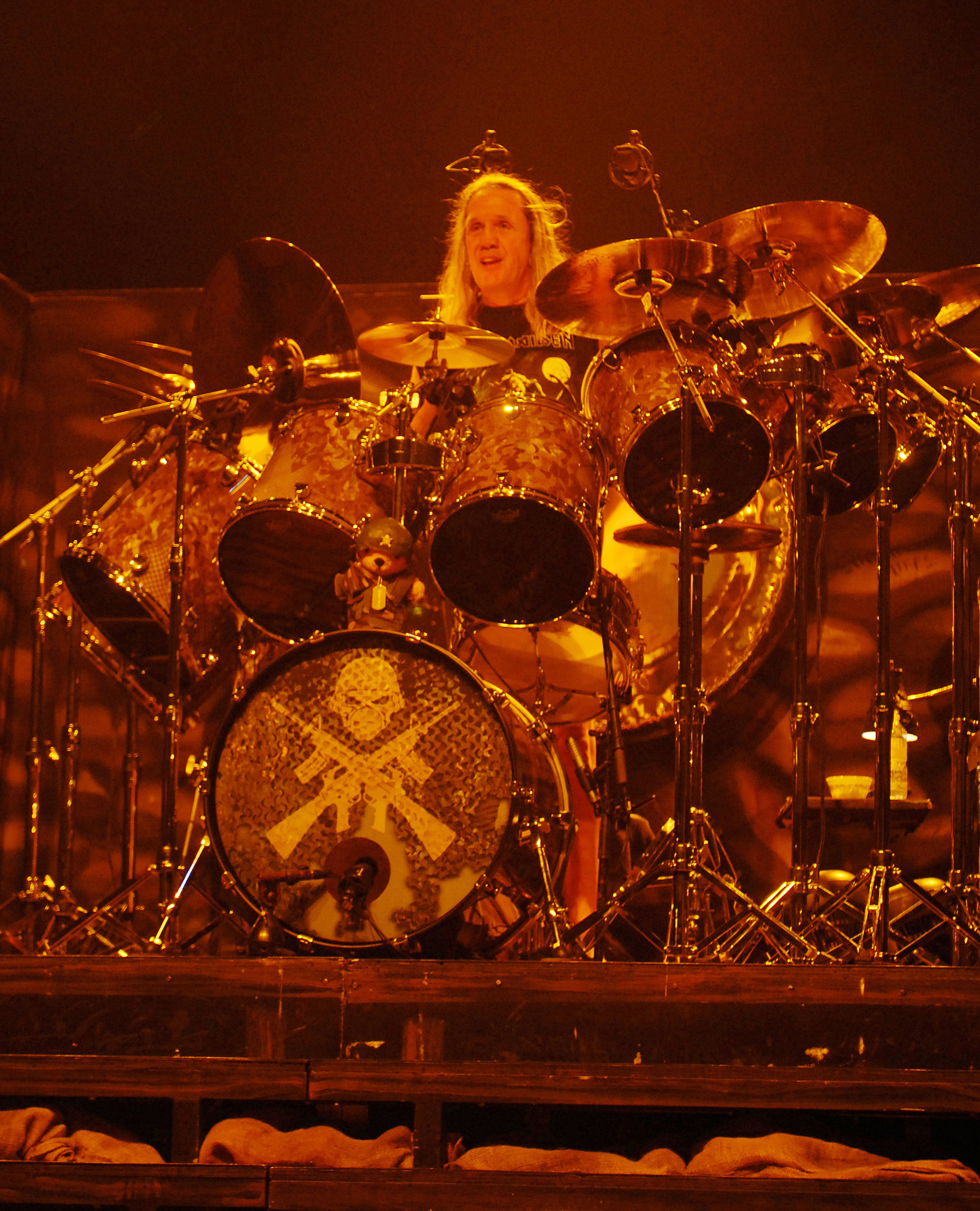
Any qualms about performing that song tonight?
“Like most of our material, Brighter… is just an observation, a commentary – it’s not all doom and gloom,” insists Smith, who co-wrote the track with Harris and Dickinson. “Some of our songs are quite uplifting – you can deal with a heavy theme but have a rousing chorus. It works on that level.”
Tonight’s show is a blinder. Lauren Harris manages to slip a version of UFO’s Natural Thing into her support set – a sure sign of her father Steve’s influence. And it’s great to see Maiden in more intimate surroundings. Away from the big-time, capital-city scrutiny of Tokyo’s Budokan, the band are more relaxed, more animated, more action-packed.
Again, the fact that A Matter Of Life And Death is being played in its totality doesn’t appear to faze the audience. The only voice of dissent we hear is when we nip into the foyer and discover a cluster of Americans by the exit door. One is shouting: “Fuck all their new shit! I wanna hear The Trooper!”
Get a life, dude. Now where’s that security guard with the rolled-up newspaper?
